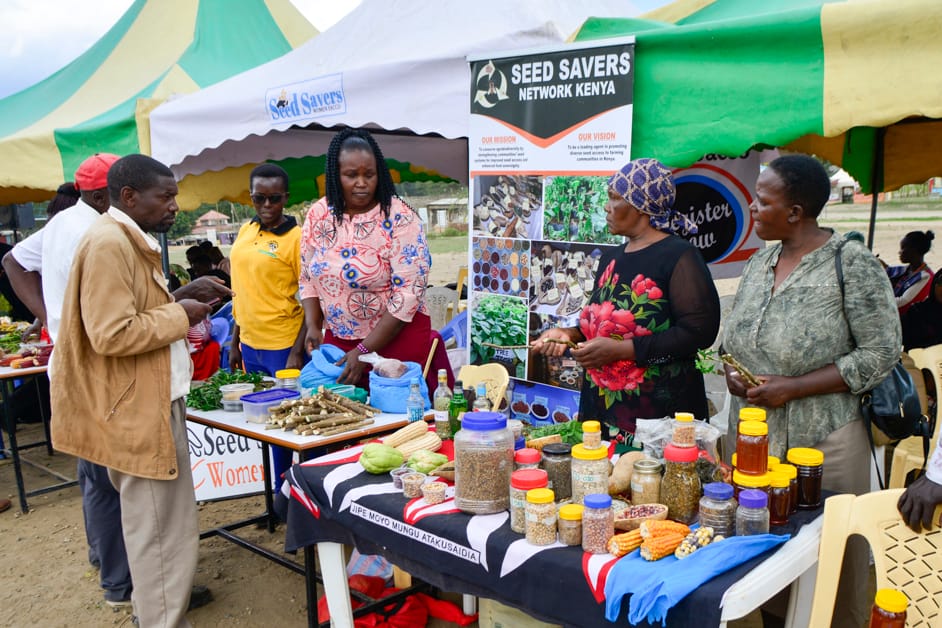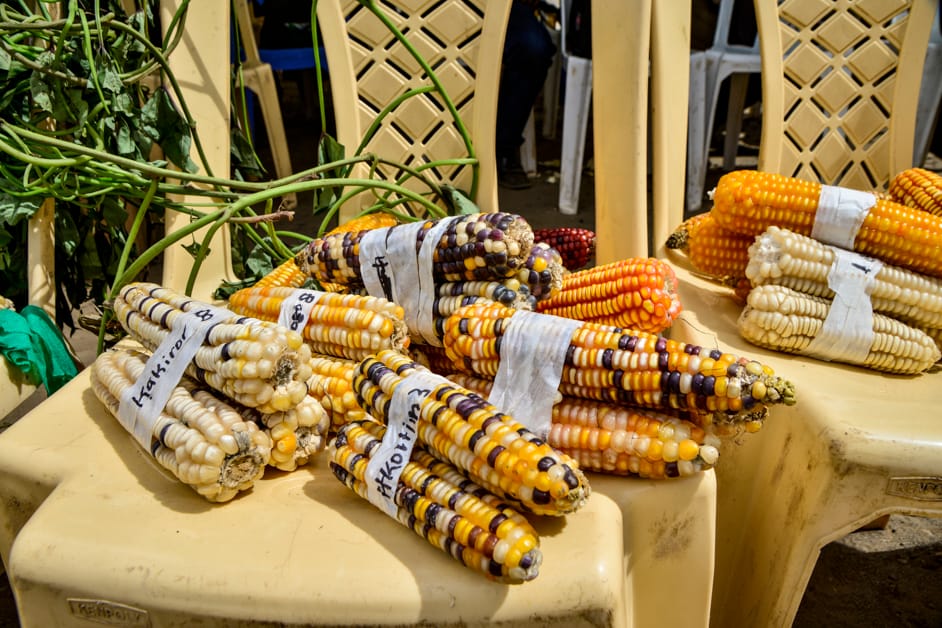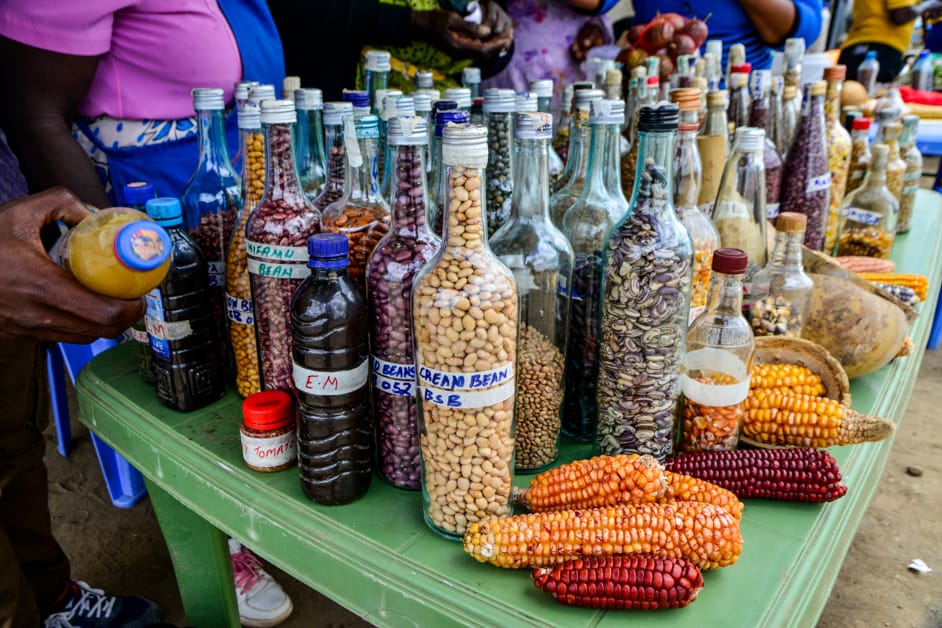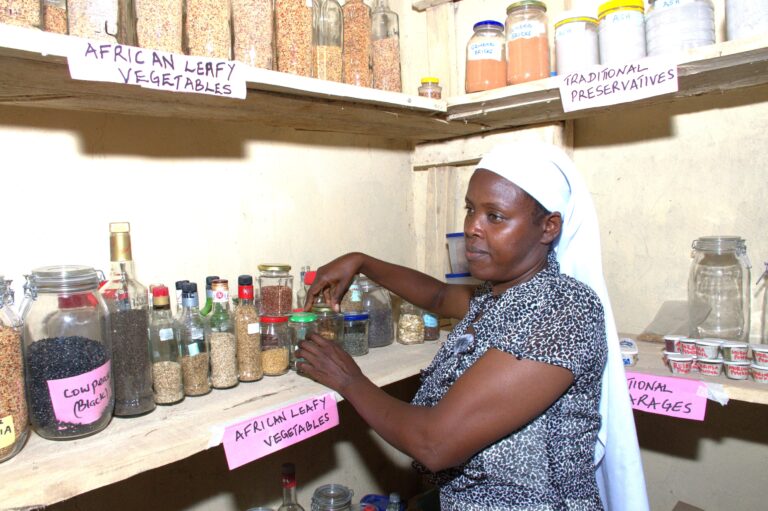By Suleiman Mbatiah
In the sunlit, dusty town of Kikopey, near the sparkling shores of Lake Elementaita in Gilgil, Nakuru County, a group of farmers gathers under makeshift tents and the sprawling shade of acacia trees. This is no ordinary meeting—it is a vibrant Indigenous seeds fair, a lively exchange of seeds from various regions across Kenya. Each farmer brings their unique varieties, not just to share, but to safeguard a legacy that stretches back generations.
These seeds, carefully preserved and passed down through families, are more than just a means of growing food. They are a lifeline in the face of a rapidly changing climate. So engrossed are the farmers in their mission that not even the tantalizing aroma of Nyama Choma wafting from the nearby Kikopey eateries along the Nakuru-Nairobi highway can divert their attention. For them, preserving their heritage and securing the future of food is a calling that demands unwavering focus.
But what’s even more fascinating is how these farmers store their precious seeds. In a stroke of ingenuity, they’ve turned to old beer and wine bottles, as well as repurposed plastic containers, to keep their seeds safe and dry. Picture this: a dusty exhibition table, lined with colourful bottles that once held Tusker, Gilbeys, County or Drostdy-Hof, now filled with rare millet, maize, pumpkin, and bean seeds varieties. It’s an unusual yet brilliant solution that not only preserves seeds but also gives a second life to non-biodegradable materials that would otherwise clutter the environment. Who knew that an empty County bottle could become a vessel of hope for future harvests?

For 60-year-old Peninah Wanjiku, a smallholder farmer from Gilgil, these seeds are a tangible connection to her ancestors. “My grandmother taught me how to save these seeds,” she says, cradling combs of coloured maize in her weathered hands. “She told me they would always feed us, no matter how hard the times were.” Today, as unpredictable weather patterns and extreme temperatures threaten food security across the globe, Wanjiku’s words ring truer than ever.
Indigenous seeds, cultivated and preserved by communities like Wanjiku’s for centuries, are emerging as unsung heroes in the fight against climate change. Unlike modern hybrid varieties, which are often bred for specific conditions, these seeds have naturally evolved to thrive in diverse environments. Their resilience and adaptability make them a critical resource in ensuring food security for future generations.
Daniel Wanjama, Director of the Seed Savers Network – Kenya, has dedicated his life to preserving these seeds. “Indigenous seeds are not just about food,” he explains. “They are about culture, heritage, and survival. They carry the wisdom of our ancestors and the promise of a sustainable future.” His organization, based in Gilgil, works with small-scale farmers to conserve agricultural biodiversity and promote the exchange of traditional seeds.
Dr. Wanjiru Kamau, a food activist, advocates for a shift in attitude away from food stereotypes, urging a focus on food sovereignty as a means to revive declining agricultural practices and address the pressing challenge of climate change. She emphasized the need for communities and nations to have autonomy over their food systems, including the use of traditional and indigenous seeds, prioritizing local knowledge and biodiversity conservation for sustainable agriculture.
“Food sovereignty acknowledges the importance of indigenous seeds in preserving cultural heritage, ensuring sustainable agriculture, and reducing dependence on external sources for seeds and food production,” she notes.
Wanjiku is one of the many farmers who have benefited from the Seed Savers Network. “When the rains failed last year, my hybrid maize crops withered,” she recalls. “But the indigenous sorghum and millet I planted from saved seeds survived. They didn’t need much water, and they still gave me a harvest.” Her story is a testament to the power of these seeds to withstand the challenges of a changing climate.
However, the journey to preserve indigenous seeds is not without its struggles. In November 2022, a group of smallholder farmers filed a case in the Machakos Law Courts challenging the Seed and Plant Varieties Act Cap 326 of 2012, which criminalizes the sale and sharing of unregistered and uncertified seeds. This legislation directly contravenes farmers’ rights as enshrined in the International Treaty on Plant Genetic Resources for Food and Agriculture (ITPGRFA).
If found guilty under this law, offenders face severe penalties, including up to two years in prison, a fine of up to KShs 1,000,000, and a prohibition on the sale and exchange of traditional (peasant) seeds. This legislation has sparked significant concerns among farmers and advocates for seed sovereignty, as it severely restricts their ability to preserve and share indigenous seed varieties.
For farmers like Wanjiku, this case strikes at the heart of a centuries-old tradition of seed exchange. “How can they tell us not to share what our ancestors left us?” she asks, her voice reflecting both frustration and determination. A favorable ruling would not only protect this vital practice but also empower farmers to preserve their heritage and sustain their livelihoods for generations to come.
Dr. Daniel Maingi, a science and development practitioner, echoes her concerns. “Farmers have the inherent right to save, exchange, and use seeds,” he says. “But the punitive laws are eroding these rights, forcing farmers to depend on commercially controlled seed varieties.” He warns that this could lead to a loss of biodiversity and further vulnerability to climate change.
Despite these challenges, there is hope. Organizations like the Seed Savers Network are empowering farmers with the knowledge and tools to preserve indigenous seeds. Dr. Liliam Samoei, an agronomist at Egerton University, believes that education is key. “Farmers need training on climate-smart practices and the value of indigenous seeds,” she says, during a workshop designed for media practitioners at Kikopey Seed Bank. “When they understand how these seeds can help them adapt to climate change, they become champions of their food security.”
For Wanjiku, the fight to preserve indigenous seeds is deeply personal. “These seeds are my heritage,” she says, her hands cradling combs of colourful maize. “They are my children’s future. If we lose them, we lose a part of who we are.” Her determination is shared by countless farmers across Kenya and beyond, who continue to sow the seeds of hope in the face of an uncertain climate.
As the sun sets over Lake Elementaita, casting a golden glow over a flock of flamingos lining the shores, Wanjiku and her fellow farmers pack up their seeds, ready to plant them in the coming season. Their work is a quiet but powerful act of resistance—a reminder that in the fight against climate change, the solutions may lie not in modern technology, but in the wisdom of the past.

Soon, a landmark ruling on the case challenging restrictive seed laws will be delivered at the Machakos Law Courts. This case, filed by smallholder farmers – the majority of whom are women – and supported by the Seed Savers Network and Greenpeace Africa, represents a significant moment for agricultural rights. The farmers are hopeful and optimistic about a favourable outcome, as they firmly believe in their right to save, use, exchange, and sell their farm-saved seeds and propagation materials.
The seeds exchanged in Kikopey are more than just grains; they are a symbol of resilience and hope. Today, Wanjiku is leaving the fair with a treasure: the seeds of the rare jute mallow, a leafy green vegetable cherished in Western Kenya for its nutritional value and cultural significance. In exchange, she has shared a quarter-kilogram of giant pumpkin seeds, a variety known for its robust size and resilience.
This exchange is more than just a transaction; it’s a bridge between communities, a celebration of heritage, and a step toward preserving agricultural diversity. As climate change continues to disrupt food systems worldwide, the wisdom of farmers like Wanjiku and the efforts of organizations like the Seed Savers Network offers a blueprint for a sustainable future.
In the words of Daniel Wanjama, “When we save a seed, we save more than just a plant. We save a story, a culture, and a future.” As the farmers at Kikopey’s indigenous seeds fair pack their precious seeds, they carry with them not just seeds, but the promise of a world where biodiversity thrives and food security is within reach for all.



